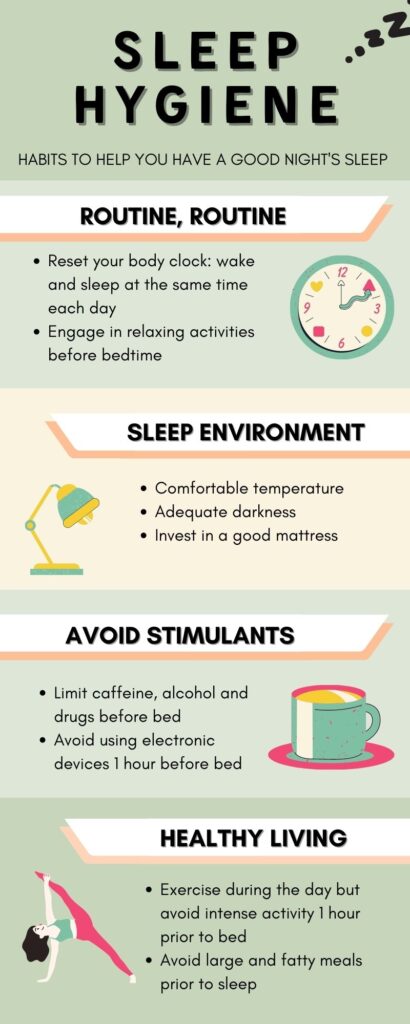In our last blog post, we reviewed what sleep is and why it is important. But I know what you’re thinking — “That’s all fine and good. Now, how do I improve my sleep?” Below are my 10 steps to better sleep. Because our brains and our circadian clock function best under repeated patterns, the best way to improve sleep is to establish regular, predictable habit routine that allows it to function optimally.
My 10 Steps to Better Sleep:
 1. Good sleep starts in the morning.
1. Good sleep starts in the morning.
⁃ Wake up at the same time every morning, no matter how well or poorly you slept the night before.
⁃ Try to get bright sunlight within the first hour of waking. If you cannot get sunlight, turn on overhead lights in your house. Avoid wearing sunglasses in the morning, if possible. You are flooding your eyes with blue light in the morning, which is what your body needs.
2. Caffeine blocks adenosine, which is why it helps you feel more alert. But avoid caffeine in the afternoon in order for adenosine to work properly (our Precision Medicine program looks at genetics involved with caffeine timing and sleep).
3. Try to get some amount of physical activity, especially outside, before suppertime.
4. If you struggle with sleep, avoid naps during the day.
5. Avoid calorie intake (supper, snacks, alcohol) at least 2-3 hours before bedtime (your gut is on a circadian clock, too! This also will reduce reflux symptoms).
6. After suppertime, turn off or dim overhead lights and only use lamps.
7. Avoid screen time 1-2 hours before bedtime (cell phone, TV, iPad, bright e-readers, video games, etc). Blue light supresses melatonin production, a necessary hormone for sleep.
8. Do something relaxing an hour before bed, ESPECIALLY if you suffer from ruminating thoughts and anxiety (read, meditation, journal, listen to calming music, warm bath, etc). Do not read the news!
9. Go to bed at the same time each night.
10. Make the bedroom a sanctuary:
⁃ Only use the bed for sleep and sex
⁃ Keep the room temperature around 68F
⁃ Consider a sound machine/fan to block outside noises
⁃ Keep the room as dark as possible (cover LED lights, no nightlights, consider blackout curtains)
⁃ No pets in the bed!
But what about sleeping pills?
I do prescribe medications (i.e. zolpidem, trazodone, doxepin, and others) to patients suffering from insomnia and many others regularly take over-the-counter options like Benadryl and Tylenol PM. However, these medications were never intended to be used for longer than a few months and only after you have properly addressed sleep hygiene. Multiple studies show that these medications barely increase the time you are asleep but at the expense of medication side effects, diminished quality of sleep, problems with dependency, and increased risk of death.
I empathize with patients suffering from insomnia and sleep deprivation, as I know this brings a lot of suffering and anxiety. It can also be very hard to come off of sleep medications if you’ve been taking them for years. This is why addressing sleep problems early on and optimizing your sleep hygiene is vitally important.

1. Do not wait until you are suffering to take these first steps. It may take months for the above steps to help get your brain in a better sleeping pattern.
2. Patients with true insomnia should opt for sleep therapy (CBT-Insomnia) first. Anxiety, depression, sleep apnea, other chronic medical conditions, and medication side effects are common reasons for reversible insomnia.
3. A few restless nights are not harmful. Worrying about poor sleep just makes you sleep poorly! Trust the process and know that your body has been designed to sleep well.
If you need more help, please call us to talk more or consider a referral for sleep therapy.
Thank you for reading and good night!











